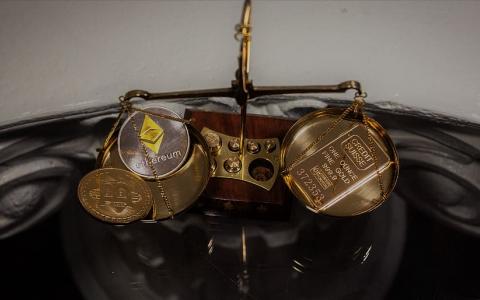
Greg Lai, lead portfolio manager at Sowell, recently published this op-ed in Arkansas Money & Politics. If your clients are begging for crypto exposure you can't legitimately support, it will probably be an extremely useful read. And of course the Sowell team has a lot more like this.

What is Bitcoin? I find that this question is coming up a bit these days, especially within and outside the halls of Sowell Management. One finds oneself wondering if this is that “canary in the coal mine” moment? In fact, I fight the urge to ask my Uber driver what his analysis of cryptocurrency and Ethereum or for the next hot crypto tip. At Sowell, it is our responsibility to answer far more important questions like “When can I retire?” or even “Can I retire?” or finally, “What should I invest in and how should I invest?”
“What is Bitcoin?” or even ‘What is crypto?” is a far more intricate answer and that already may be telling. The answer involves concepts around trust, blockchain technology, public distributed ledger system, and secured cryptography on a peer-to-peer network. Huh? Not to be outdone, there is “mining” and “wallets” – though not the kind that comes to mind. Taxed as “property” by the IRS, tool of choice for criminal activity, like ransomware, and the inventor nom de plume Satoshi Nakamoto. There is so much here that we won’t cover in this piece. But what we will cover is the words and assumptions that people are making when thinking about how Bitcoin would fit in an investment portfolio designed to be there at retirement. Simply not what is Bitcoin, but what does it replace or how does it fit based on its description?
First thing we hear is Bitcoin is a currency– even better a “digital currency.” Currency has been around for 5,000 years and has taken many forms starting with shells and beads, easily traded items, and then coins with specific values. The key value was that this agreed upon and standardized form allowed for an exchange system rather than trading items and services through barter. An allocation to currency doesn’t fit into a long-term investment portfolio as a means for returns in most scenarios. In fact, given quick and easy access to your currency, rather than the lost opportunity cost when you “invest” it, there is no requirement for a return, think time value of money (TVM). In this case, we see no basis to invest long term in a currency, digital or otherwise, “cash is trash.” More importantly, current currency is used to pay bills and purchases through the “exchange system” and stability is paramount. In its short history, five years roughly, Bitcoin’s value has been far from stable and far from integrated into the “exchange system.”
Bitcoin is a commodity and thus an inflation hedge. A lot to unpack here when talking about inflation, none of which is the fact that there are 5,000, and rising, crypto currencies today when a few short years ago there was less than 100. Let that “inflation” sink in for second while we delve into the commodity aspect of Bitcoin. Here again we have a great set of comparisons, like gold or oil. Let’s focus on gold. First, gold has proven uses in industry but even better, it has a long history of value as a commodity throughout world history. Its safe haven status has weathered the rise and fall of civilizations, world wars, civil wars and violent regime changes throughout the existence of recorded history. Lastly, gold is truly mined and not invented, check the periodic table (AU is the symbol), and its supply is relatively known and fixed. Gold has a cost of carry and could have a place in an investment portfolio, but in most scenarios a very small allocation. The value of gold being highly dependent on the prospects of inflation, and its predominant use is as a store of value against inflation rather than growth. It seems to us, Bitcoin needs a much longer history before it can replace gold. And in an ironic twist, blockchain technology creates the transparency and ability to create efficiencies that exactly work against inflation.
Back to oil. One word… petrodollar. When they call it petroBitcoin, let me know. Bitcoin is an equity. Traditionally a stock represented an ownership position in exchange for money whereby the company can use that money to build a future cash flow supporting the value of that exchange. For sure, equity shares represent some value behind the business that these companies represent and also the supply and demand of these shares from buyers and sellers. Bitcoin has this for sure. Its meteoric rise in value is driven by supply and demand, arguably solely this dynamic. Equity investing is best deployed by using the power of diversification and so Bitcoin as a representative holding within a portfolio of stocks could make sense, however, what would be the expected return over time? What is that risk and return expectation based on? Typical stocks have corporate and fiduciary responsibilities to shareholders enforced by interested parties like the SEC and state laws. Bitcoin has none of this and actually we have to trust in “uninterested” parties to maintain the integrity of the blockchain ledger. Should I be skeptical that certain parties would be more interested in an economic incentive of developing the next new Bitcoin? When looking at Bitcoin through the lens of an equity investment, can I imagine it continuing at a 408 percent annualized return in the future? Highly unlikely. This means it’s something you trade and is as risky as any other single stock and should be sized accordingly.
Bitcoin is debt? Nope. Bitcoin is a new and distinct asset class. Unsupported at this time.
Our conclusion, Bitcoin is not yet any of the above. In no way does this mean that it wouldn’t be fun to trade a little Bitcoin or Dogecoin but know that its place as a significant investment is not advisable. But fear not, even if Bitcoin is the “most disruptive technology invented in the form of payments and currency exchange,” you won’t be missing out. Be sure that every other company or stock will benefit from that disruption and the efficiencies created. In much the same way that one dreams in one’s native language, the financial markets of the world will still dream in dollars – U.S. dollars.
Op-Ed originally published in Arkansas Money & Politics by Greg Lai May 25, 2021 Advisory services offered through Sowell Management, a Registered Investment Advisor. The views expressed represent the opinion of Sowell Management. The views are subject to change and are not intended as a forecast or guarantee of future results. This material is for informational purposes only. It does not constitute investment advice and is not intended as an endorsement of any specific investment. Stated information is derived from proprietary and non-proprietary sources that have not been independently verified for accuracy or completeness. While Sowell Management believes the information to be accurate and reliable, we do not claim or have responsibility for its completeness, accuracy, or reliability. Statements of future expectations, estimates, projections, and other forward-looking statements are based on available information and Sowell Management’s view as of the time of these statements. Accordingly, such statements are inherently speculative as they are based on assumptions that may involve known and unknown risks and uncertainties. Actual results, performance or events may differ materially from those expressed or implied in such statements. Investing in securities involves risks, including the potential loss of principal. While equities may offer the potential for greater long-term growth than most debt securities, they generally have higher volatility. International investments may involve risk of capital loss from unfavorable fluctuation in currency values, from differences in generally accepted accounting principles, or from economic or political instability in other nations. Past performance is not indicative of future results.



